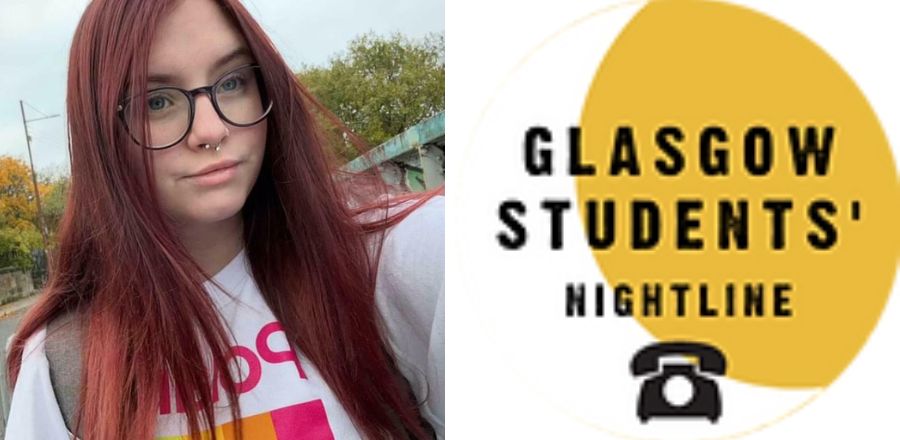Forensic Investigation student uses social media to help others with the Glasgow Student Helpline

A Forensic Investigation student has been using the power of social media to help students with their mental health, thanks to a voluntary role with a student support helpline.
3rd year Forensic Investigation student Aspen Milledge has been using her creative side to manage the social media channels for the Glasgow Student Nightline; a confidential listening and information service run by and for students at Glasgow Caledonian University, Strathclyde University and Glasgow University.
The service, which can be accessed via telephone or instant message from Monday to Friday, allows students to speak to an anonymous volunteer about any issues they may be experiencing. The Nightline operates under the national Nightline Association, which adheres to practises created by mental health professionals, legal advisors, Samaritans, and the Helplines Partnership.
As someone who has experienced issues with their mental health, Aspen wanted to use her situation to help others going through similar problems. After discovering the Glasgow Nightline, Aspen discovered an excellent opportunity to support fellow students:
For those who don’t know, what is the Glasgow Student Nightline and how does it work?
“Nightline is an anonymous, confidential, student-run service designed FOR students. When anyone contacts the Nightline, there is always another student on the other end of the line – whether it’s a call or a message. It’s nice, because our student volunteers can relate with the callers. More often than not, the volunteers have went through similar problems so they can empathise with those who are calling the line.
Even our volunteers remain anonymous, which is really important. I often find that some people will call services like this and expect advice, but others call and simply want someone to talk to. We are there to listen, not lecture and that’s our slogan. When students call in, we let them explore their feelings and let them lead the call. We’re not there to tell them what to do, it’s a chance for them to vent their feelings.
A lot of the current listening services close quite early in the evening, but our lines operate from 7pm-7am and we can cover a lot of ground with that. Charities like Samaritans also operate later into the evening, but this means that there’s a lot more pressure on them to deal with problems. We hope that Nightline can help alleviate that pressure a bit.”
Why did you decide to work with the Glasgow Student Nightline?
“My own mental health has been a defining factor in my life. I’ve learned to deal and grow with it but I grew up in an area in the US that didn’t really offer a lot of support helplines relating to mental health. I really wanted to help others that may feel the way that I do, so working with the social media team has been really great in terms of helping people. It allows me to broadly reach out to people in a larger way, which shows the benefit of social media. I often speak about the effects that social media can have; a lot of people will be consuming content that makes them upset, but our social media is designed to be positive. People can find it while scrolling and our content might say “If you’re not doing okay, give us a call” and show that we can be there for them if they need it.
Recently, I’ve been sharing content about the different aspects of Nightline to help people understand what’s involved if they decide to use the service. Sometimes, making the first step to actually call us might be really difficult for someone and I’m trying to make it a little bit easier. I know how it feels to be scared to reach it, it can be really daunting. We understand the thoughts that they might have about it, so we’re trying to share content that makes it less intimidating. One of my recent posts involved the four principals of Nightline; non-advisory, non-judgmental, anonymous and confidential. We have an issue with callers understanding what we actually do, so this helps people know what to expect when they call. We also use the social media pages to share other mental health related resources, as well as self-care tips.
Not everyone will get the courage to call the Nightline, but our social media will at least show positive content to whoever may need it.”
You’re clearly very passionate about your role, why do you enjoy it so much?
“I talk about being involved with Nightline all the time! I genuinely enjoy being that person that I would have needed when I was younger. I understand how it feels to feel alone, and everyone, at one stage of their life, will have felt the same at some point. I want to help make that safe space for people to speak about how they’re feeling, because not everyone has that.
It opens up a lot of opportunities for people in relation to volunteering. A lot of our volunteers are psychology and medical students and they have all said how Nightline has really opened their eyes. In their studies, they’ll get the chance to help people down the line, but many of them have commented on how Nightline is a great way to help people in a tangible way. It’s a great community that we have and it helps us look after each other’s welfare as well, because it’s important that we look out for the volunteers as well.
We’ve a;; made some friend friendships since being involved with Nightline. University is a great place to make friends, but the first thing I always tell new students is to get involved with something that they care about. It’s a chance to meet like-minded people who all have the same passion.”
By Rachael McAlonan
Got a SCEBE or GSBS story? Email me at Rachael.McAlonan@gcu.ac.uk or connect with me on social media here
